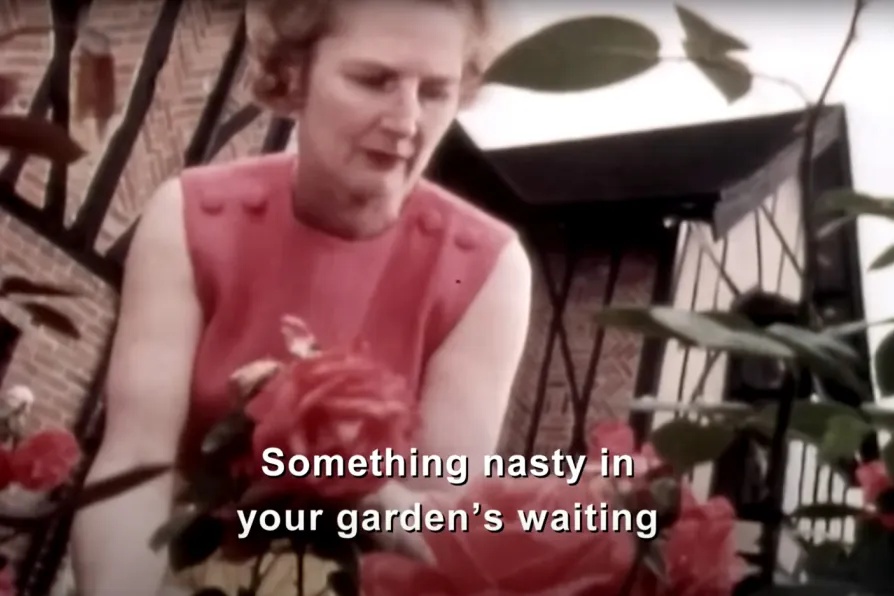GORDON PARSONS applauds a marvellous story of human ingenuity and youthful determination, well served by a large and talented company
This plundering of the archive tells us little about reality, and more about the class bias of the BBC, muses DENNIS BROE

 Shifty [Pic: Courtesy of the BBC]
Shifty [Pic: Courtesy of the BBC]
Shifty
Directed by Adam Curtis
★
THE French philosopher Gilles Deleuze said editing is another form of thinking. Maybe he hadn’t seen the films of Adam Curtis where editing, or the rapid cut, rather than any other form, simply overwhelms thinking and seeks to render it obsolete and unnecessary, an impediment that only slows down image making. This is thought in the age of AI.
Curtis’s latest BBC documentary Shifty: The Land of Make Believe begins by focusing on how things have changed in the British Isles since the deindustrialisation of the early ’80s, with the onset of Thatcher, and presumes to answer in the five-part series how and why the momentous social changes and disruptions have occurred.
Unfortunately, with Curtis, the how is a series of juxtaposed and loosely related moments obscured by the failure adequately to answer the why.
There is the frightening opening of Thatcher in Hansel and Gretel Wicked Witch mode welcoming children into her den of iniquity. This is followed by fast cross-cutting around the British Isles, including her “Let’s cut the number of immigrants to preserve free speech and tolerance” announcement, leading to National Front rallies. This is followed by a middle-class white couple supposedly fulfilling Thatcher’s desire to have people own their own home, a rationale for defunding public housing, in a quest to free people from the “dependence on the state as master.”
Precious little about the working class — except how it is divided along racial lines — is followed by a “monetarist” explanation of why factories left Britain. It seems that the Milton Friedman model of flooding or withdrawing money from circulation is the culprit: withdrawing in the case of Britain in the 1980s and flooding in the post-2008 crisis which is still with us today.
However, this does not explain why the factories left. Curtis suggests that this is because high interest rates accompanying the currency withdrawal forced them to leave. They left in Britain, as in the US, decimating whole communities and causing three million unemployed because the profits were greater and the salaries lower overseas. They left for the reason that capital always leaves, to make more money.
Curtis’s style seems to summon working-class concerns, mixing the popular and sometimes resistant forms of reggae, ska, punk and power pop, while paying lip service to minority opposition to these cleavages. In fact, however, the documentary — which does move with lightning speed, making rapid and often nonsensical associations (we cut from a mention of Marcus Garvey to cheese and onion crisps on an assembly line) — is torn from the BBC archive and for the most part presents a recounting of the Thatcher era from the increasingly limited point of view of the British non-committed middle class.
Says one interviewee: “I’ve given up. I’ve just completely given up,” proclaiming himself at middle age, “waiting to be measured for the old box”; that is, for his coffin. But the conservative part of the middle class is always thus, forever despising and looking down on the poor, envious and looking up at the rich, and distraught over their position, caught between the two.
Since Curtis’s work is drawn from the BBC archives, in the end, it cannot furnish a social and economic explanation for the changes that have occurred in a Britain which refuses to take its place as a nation among others, but clings to its colonial legacy. Rather, it is a documentary about the BBC itself and the limited coverage it supplies of a country and a people that it is supposedly funded to represent.
The monetarist explanation is unconvincing and ultimately Curtis and his cronies throw up their hands and opt for chaos theory, where, like the Marvel Comics Multiverse, or DC’s Crises On Infinite Earths, “You could fall into a black hole and come out in another part of the universe.”
One wishes that Curtis, a gifted documentary film-maker and thinker, could offer more than just this simple collage of images. Why can’t he offer more complex explanations, perceptions and a materialist grasp of reality, that rises above comic-book word balloons that do little to illuminate the (capitalist) forces at play in past and present, and a lot to obscure it.
Shifty is available on BBC iPlayer.

KEVIN DONNELLY accepts the invitation to think speculatively in contemplation of representations of people of African descent in our cultural heritage

DENNIS BROE finds much to praise in the new South African Netflix series, but wonders why it feels forced to sell out its heroine

DENNIS BROE enjoys the political edge of a series that unmasks British imperialism, resonates with the present and has been buried by Disney

DENNIS BROE sifts out the ideological bias of the newest TV series offerings, and picks out what to see, and what to avoid









